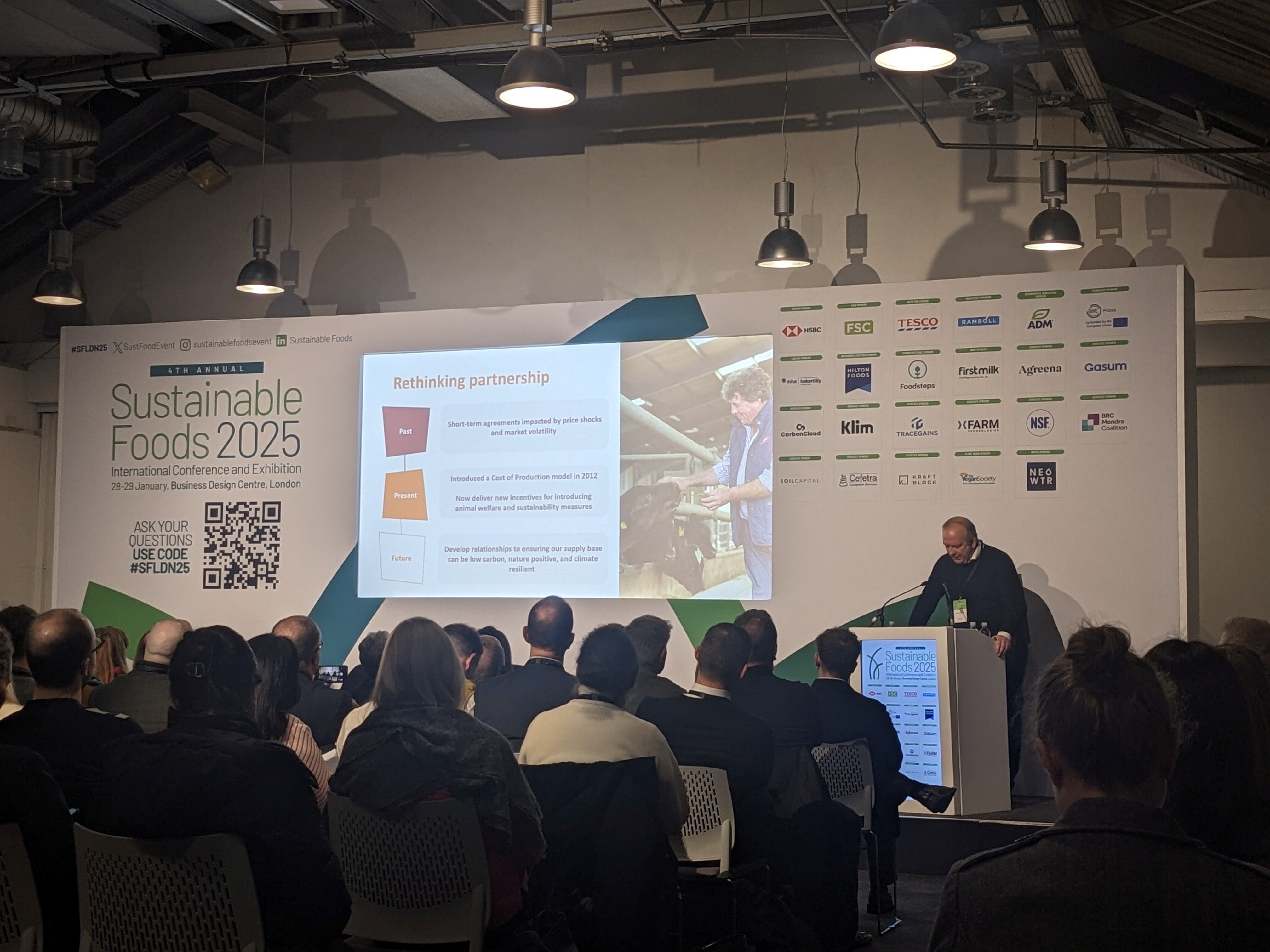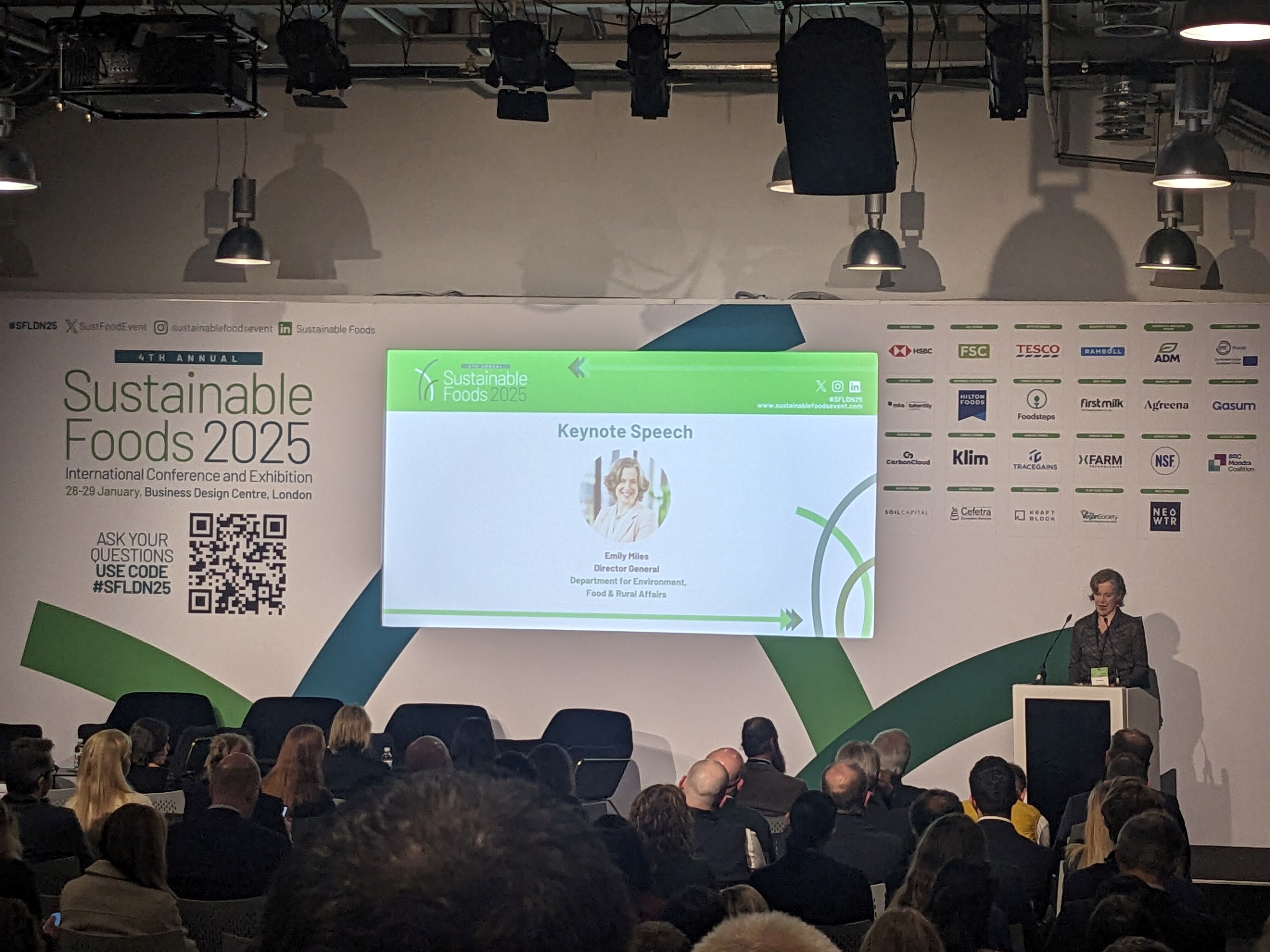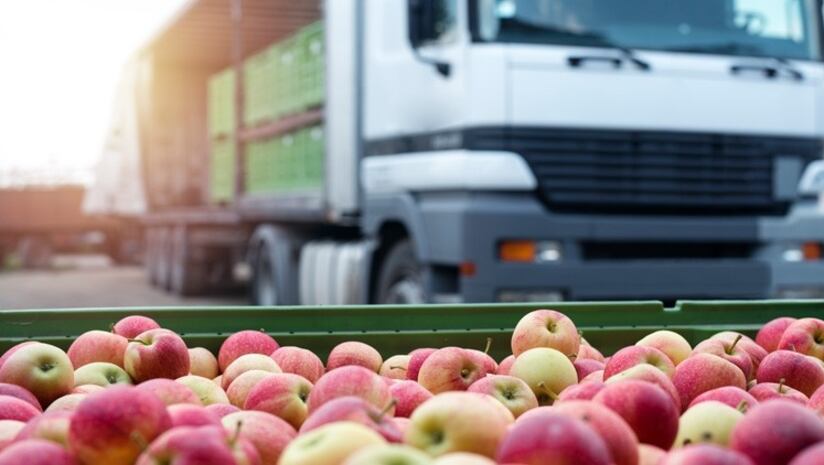The world is in a bit of a mess. Between climate change, geopolitical unrest, economic uncertainty, and a food supply chain at odds with both the Government and itself, it’s all getting rather complicated.
These challenges are well-known to us all by now, with many of the same mantras repeated year after year by industry spectators and stakeholders alike. Perhaps this is a sign of maturity, as one delegate suggested to me at this week’s Sustainable Foods Conference, rather than an indicator of inaction.
This cylindrical cycle was also noted by Roger Saul, founder of Mulberry & Sharpham Park during a session he chaired focused on food security: “Today we’re going to be controversial. We’re going to try and hit some of the big subjects, but what we’re also going to try and do is come out with some of the solutions because so often it’s doom and gloom, ‘it’s all going wrong’ – [so,] what are we going to do about it?”
In Saul’s view there are five major stakeholders who have the power to create meaningful change:
- Big landowners
- The Government
- Retailers
- Investors & banks
- Consumers
The 2024 UK Food Security Index UK shows we import around 40% of all our food. We produce most of the cereals, meat, dairy and eggs we eat, but the figure for domestically produced vegetables (55%) and fruit (17%) are much lower.
Saul pointed out that this is an interesting metric when one considers the move (or at least push) towards plant-based diets, especially when much of the UK’s land is devoted to animals, be it feed or livestock.
He painted a bleak state of affairs for local farmers, as he informed the audience that over the last five years – effectively since Brexit – the Government has reduced grants for farmers by 76%; while more recently, the inheritance tax has come swinging on top as farmers face ever-rising costs.
“All of those together mean now that wafer thin margins are now destroyed,” Saul said, as he flagged that no investor would look at the sector and want to invest.
At the same time, we have seen yields for all the main cereal crops and oilseed rape drop, with wheat down 20% from 2023.
“You look at my own walnut production, we’ve gone down by 67% this year because of wet weather,” Saul added.
His list of headwinds continued, citing world conflict and Trump tariffs as he painted the grim reality: “We have too many potential problems for how we get our food.”
Landowners’ power
Turning his attention to landowners (around 30% of agricultural land in England and Wales are under tenancy agreements) – Saul questioned former NFU boss Minette Batters on what they can do.
Batters was clear on her stance of nature and food working together: “We have got to have food production and achieving for nature as mutually inclusive not exclusive. That is absolutely fundamental.”
She offered the recent move from the Crown Estate – which has doubled its fund to drive green practices on farms, with an aim to repurpose 15% of farmland on new tenancies to nature recovery by 2030 – as a great approach for other landowners to follow.
When asked if the Government could support with finance to landlord and tenants to form more partnerships akin to this, Batters was brutally honest: “We have to accept that we’re broke”.
She added that getting these markets to function in the private sector would be an ideal future. She gave a nod to the Environmental Farmers Group – a catchment trading platform of cooperatives she is a part of – as a way forward of encouraging biodiversity on farms and to empower farmers.
“If we could have that right across the country, every farm in a farm cluster knowing what species they have, what wildlife they have – a farmer and an ecologist hand-in-hand.”
Saul conceded it was perhaps half of the solution, highlighting the complexity of finding solutions fit for all in this complex agri-food landscape.
Retailers’ power
Offering his thoughts on retailers, Guy Singh-Watson, founder of Riverford Organic, disputed Saul’s shout-out to supermarkets which have recently come together to back farmers as they protest against inheritance tax changes.
“I just can’t believe you’re advocating this is a great thing supermarkets are getting behind,” Singh-Watson retorted. “They waited about a month, didn’t they, to be absolutely sure what side public opinion was on.
“It’s just a cynical, hypocritical PR move by the supermarkets.
“The reason farmers are arguing to be a special case with regards to IHT is because they make no money. Why do they make no money? Because they’re being screwed by supermarkets.”
“What they’re [supermarkets] in effect asking for is for taxpayers to continue subsiding British agriculture so they can pay b**** all.”
Singh-Watson argued that if we want to drive consumer choice to back British farmers, it’s vital they understand how and where their food is farmed.
He argued that supermarkets and producers deliberately obscure the origins of their products by using emotive, misleading names that create the illusion of locality, contributing to a widespread lack of consumer understanding.
“They are ripping off British farmers, stealing our story, paying us as a commodity and selling it at a differentiated, marked up price. When I started in vegetables and cattle, [the price] it was 40p in a pound, today for fruit and vegetables it’s about 25p.”
Adding what action he’d like to see from supermarkets, he said the technology was there in barcodes to provide consumers with all the information they need to make informed decisions. From there, they can choose whether to back British or not.
“[But] that’s not what the supermarket want,” he argued, contending that it suited retailers more to keep the supply chain far apart and under their thumb.
“It’s a really complex situation to solve,” Batters added, as she explained the complex rules of trading in the UK can sometimes be a hinderance.
“Even the competition law mandates we can’t talk about cost,” she said, adding that she’d received baffled looks of disbelief from US farmers when she’s told them of the UK rules.
She cited an incident from 2011 wherein several major supermarkets and dairy processors had coordinated increases in the prices consumers paid for certain dairy products in 2002 and/or 2003. The Office of Fair Trading rules that the businesses had infringed competition law and imposed penalties totalling almost £50m.
“The way we are structured is so prohibitive,” she said, emphasising that the UK’s model is reversed to many others in Europe.
“Every other market in Europe has a wholesale market that sits above the retail market.”
She continued: “Then you have the discounters, they have to discount on price. They do that and then everyone has to keep up with them […] in order retain their market share.”

In another session delivered by Sainsbury’s CEO Simon Roberts, he agreed that supermarkets hold a “critical and unique role” and must play a much more active role in rethinking supply partners and in pushing consumer behaviour towards healthy and sustainable diets.
“To define a resilient food system is of course a tricky task. This is a complex system and different parts of the system, quite understandably, have varying priorities. But I think we risk tying ourselves in knots and failing to act if we pause in order to create that definition. In fact, we could argue that we know enough in order to take effective action now,” he said.
He outlined that the critical sector is one based on “notoriously thin” margins and susceptible to economic shocks that shake the entire chain – from farmer all the way to retailer – and noting that long-term, fair contracts with farmers is the only way “meaningful, sustainable changes” can materialise.
“I really do believe we are at an inflection point as a sector in how we can and must work together,” he said, emphasising the importance of ‘getting it right’ whilst calling upon government to play their part in delivering on promised plans.
Government’s power
When it came to government’s power to act, Batters said it has a “fundamental role” in making sure the supply chain is fair.
“We have got to have a way of managing how this market works and taxpayers’ money has got to pay for what the market isn’t prepared to pay for. Even the discounters have gone to RSPCA assured eggs, that’s great but it all comes at a cost. We need a radical rethink – well Government does – of how we deliver food security,” she contended.
For Singh-Watson it’s about consistency. “No more wild swings of policy as we saw under the last government,” he begged, but added that, overall, he is “encouraged by the direction” we’re heading in so far.
In a later session, new Defra director general Emily Miles focused on the topic of government power and her belief in using it as a force for good.
“I work in government because I believe in the power of the collective to make things better and I think the government and the state can use its power for good for people and for nature,” she told the room.
“And I know that power also gets abused,” she continued. “And I also know that power can also be used with good intent but not always well.”
Miles said that government can make a difference and that she brings “a deep commitment to thinking about how to use the power that government holds well to make that difference for people and nature”.

She emphasised the tools within the Government’s wheelhouse to make those changes, including guidance, investment, regulation and strategy but added that the future will require “different thinking” to solve the challenges we face.
“We will need to do different kinds of grant giving, different regulating, different guidance setting, different ways of stimulating innovation and different kinds of strategies.
“The thing I want Defra to remain focused on are the people in the businesses who are trying to do the right thing and the people who pay for an eat the food that you produce.”





